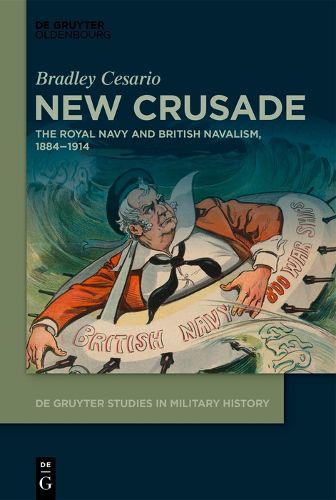Readings Newsletter
Become a Readings Member to make your shopping experience even easier.
Sign in or sign up for free!
You’re not far away from qualifying for FREE standard shipping within Australia
You’ve qualified for FREE standard shipping within Australia
The cart is loading…






The period between the mid-1880s and the First World War was the high point of the navalist movement - but the idea of ‘navalism’ took many forms, and meant different problems and different solutions to various groups within British society and the British government. New Crusade examines one form of the British navalist movement: directed navalism. As opposed to the broader cultural conception of British naval power, directed navalism consisted of a cooperative, symbiotic working relationship between three elite and self-selecting groups: serving naval officers (professionals), naval correspondents and editors working for national newspapers and periodicals (press), and members of Parliament who dealt with naval issues (politicians). Directed navalism meant agitation for a specific, achievable goal. It was the bedrock upon which the more popular and ultimately more successful cultural navalism of fleet reviews and music halls was built. Though directed navalism collapsed before the First World War, it was extraordinarily successful in its time, and it was a necessary precursor for the creation of a national discourse in which cultural navalism could thrive. Its rise and fall is the story of this book.
$9.00 standard shipping within Australia
FREE standard shipping within Australia for orders over $100.00
Express & International shipping calculated at checkout
The period between the mid-1880s and the First World War was the high point of the navalist movement - but the idea of ‘navalism’ took many forms, and meant different problems and different solutions to various groups within British society and the British government. New Crusade examines one form of the British navalist movement: directed navalism. As opposed to the broader cultural conception of British naval power, directed navalism consisted of a cooperative, symbiotic working relationship between three elite and self-selecting groups: serving naval officers (professionals), naval correspondents and editors working for national newspapers and periodicals (press), and members of Parliament who dealt with naval issues (politicians). Directed navalism meant agitation for a specific, achievable goal. It was the bedrock upon which the more popular and ultimately more successful cultural navalism of fleet reviews and music halls was built. Though directed navalism collapsed before the First World War, it was extraordinarily successful in its time, and it was a necessary precursor for the creation of a national discourse in which cultural navalism could thrive. Its rise and fall is the story of this book.